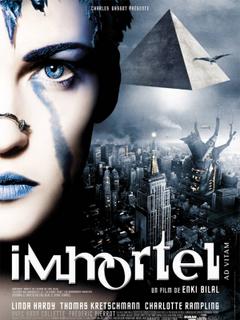Gods will be gods.
 There's some debate as to which movie was the first to be shot entirely on blue screen (AKA a "digital backlot"): Casshern, Sky Captain and the World of Tomorrow, Sin City or Immortel (ad vitam). What I find interesting is that even though all four of those movies are spoken of in the same breath because of their unique production process, they actually don't look anything alike.
There's some debate as to which movie was the first to be shot entirely on blue screen (AKA a "digital backlot"): Casshern, Sky Captain and the World of Tomorrow, Sin City or Immortel (ad vitam). What I find interesting is that even though all four of those movies are spoken of in the same breath because of their unique production process, they actually don't look anything alike.Sin City's painstaking re-creation of Frank Miller's signature monochromatic style stands in stark contrast to Sky Captain's soft-lit flapper gothic; and neither prepares you for the strange (and sometimes jarring) layering of digital dreams over flesh-and-blood actors in Immortel (ad vitam).
Directed by Enki Bilal and based on a graphic novel he wrote, the story is set in a future NYC defined by muted social order and extensive body modification. It's 2095, and everyone's an Enigma. The story revolves around a young woman named Jill who appears to be undergoing some sort of slow physical transformation throughout the movie, gradually emerging from the chrysalis of her own body as the film closes. Apparently born with unique powers and a divine destiny, Jill ricochets through a post-cyberpunk landscape, pursued by both the mundane authorities and angry gods. It's kind of hard to explain.
Also hard to explain are the superfluous--and repetitive--sexual assaults on Jill. While possessing the body of a martyred political prisoner who's recently been accidentally freed from cryogenic stasis, the Egyptian god Horus rapes Jill in an attempt to impregnate her and thus guarantee his own rebirth.
Don't feel bad if you need to re-read that last sentence; I did.
I'm not sure if Bilal is trying to draw an ironic parallel to the Xian myth of immaculate conception or comment on the displacement of agency within patriarchal religion. Personally, I suspect he just saw an opportunity to undermine the female protagonist and took it. It's kinda fucked, but sadly not that unusual for the genre. While not strictly gratuitous (since the plot does hinge on this god seeding a mortal woman), it's still gross, maybe even more so as a result of its centrality to the plot. Really, this movie revolves around a forced impregnation. This fact, like most plot points in the story, is obfuscated by the dream-like pacing, poetic script and surreal imagery. In hindsight, I'm increasingly bothered by this MacGuffin.
Eager to sacrifice linearity (and, occasionally, comprehensibility) for the sake of aesthetic, Bilal presents the audience with a kaleidoscopic tour through his own personal mythology. In that way, it's kind of like walking through someone else's dream: you know that the images are symbolic but with insufficient context, the referent-referred relationship is blurred. Steenblogen and I enjoyed it, but it definitely isn't for everyone.



1 Comments:
At 8:24 p.m., Candis said…
Candis said…
Gorgeous, gorgeous, oh-so-pretty film. LOVED IT. Mind you, I loved Sky Captain too...
And Sin City? Beautiful, but...not so much.
Post a Comment
<< Home